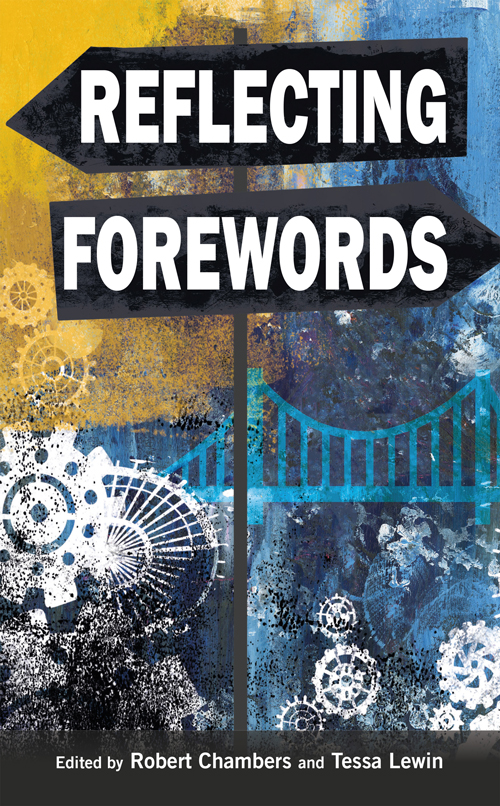Reflecting Forewords is an unusual book, one that looks backwards to look forwards. It is a collection of forewords that Robert Chambers wrote between 1986 and 2020. Organised chronologically, in some ways it reads as a biography of Robert’s interests across this time.

Robert insists he has only ever written forewords to things that he liked. The forewords here have been chosen because the books which they introduce contain valuable insights. In the spirit of the forewords, we envisage the book as a sourcebook for development practitioners that draws from the past lessons that are relevant for the future.
Buy the book Reflecting Forewords
Robert clustered his forewords into four broad themes - Paradigms, concepts and methodologies, Perceiving people’s realities, Participatory approaches and methods, and the Primacy of personal agency. I then sought out a range of scholars to write short comment pieces that positioned Robert’s forewords, or rather the texts that they introduced, within contemporary practice and scholarship, a dialogue between then and now.
 These comment pieces reflect on the significance of the work that Robert has written forewords to, which of the ideas are still important and relevant, and in some cases how the work has been influential to the field or to the commentators’ own thinking or practice. Many of the comment pieces were authored ‘by the people that Robert initially wrote the forewords for, a development that has made the form rather ‘meta’, and even more unusual in format than was originally envisaged. Some commentators know Robert personally, others don’t, and were chosen because of their engagement with the writers that Robert wrote the forewords for.
These comment pieces reflect on the significance of the work that Robert has written forewords to, which of the ideas are still important and relevant, and in some cases how the work has been influential to the field or to the commentators’ own thinking or practice. Many of the comment pieces were authored ‘by the people that Robert initially wrote the forewords for, a development that has made the form rather ‘meta’, and even more unusual in format than was originally envisaged. Some commentators know Robert personally, others don’t, and were chosen because of their engagement with the writers that Robert wrote the forewords for.
What has emerged through this process is a rich and eclectic collection of reflections on the field of international development. Marina Apgar writes about how she has built on Robert’s ideas on inclusive rigour in her own work; Jackie Shaw, on the resonances between her Healing Justice work and Sarah C. White and Asha Abeyasekera’s work on wellbeing.
Rosalind Willi writes on her use of White’s wellbeing work in her doctoral work among Syrian-Armenian communities in Armenia. Naila Kabeer shares her thoughts on a workshop on Vulnerability organised by Robert. Michael Gibbons reflects on the pioneering book Stepping Forward: Children and young people’s participation in the development process (edited by Vicky Johnson et al). Stephen Devereux writes about Seasonality, John Thompson about the Farmer First work, Priya Deshingkar on the importance of Barbara Harrell-Bond’s Imposing Aid to the field of Refugee Studies. Patta Scott-Villiers and Jo Howard, who have been bravely trying to keep alive Robert’s brilliant tradition of participatory workshops for students, write about these.
There are also contributions from Rosie McGee, Peter Taylor (for whom Robert wrote a foreword that was never published), Andrea Cornwall, Jeremy Holland, Sachin Oza, Harsh Mander, Tami Blumenfield, Jeremy Holland, Richard Holloway, Jamie Myers and Tom Thomas; twenty-two in total, in response to twenty forewords.
Evident throughout is Robert’s enthusiasm, optimism and opportunism – his constant searching for ‘methodological win–wins’. International development carries the significant historical baggage of the ‘us-them’ relationships, complicit in the exploitations of racial capitalism. But also, within it, is a long history of support for social justice movements, for relationships of solidarity and sustainability. The work that Robert champions here, sits within this tradition of Development as ‘good social change’, or as the two of us suggested some time ago ‘inclusive universal justice’. As such, it is also concerned with ‘knowing better’ to do better. Particularly pertinent given the current state of political leadership, it reflects a career-long awareness of the need for careful and critical reflexivity, and a conviction that while the imperative to act brings the inevitable risk of error, this must never be an excuse for paralysis.
Tessa Lewin is running a funding campaign to raise enough funds to make all of Robert Chambers’ books open access. Visit here to support the campaign.
